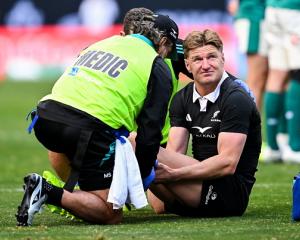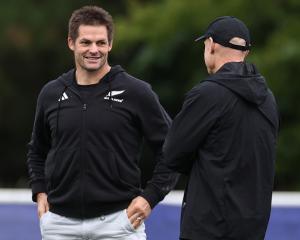
For a guy who never even made his first XV at school, Pete Gallagher has sure been involved in plenty of All Black tests.
Gallagher (45) will be sideline on Saturday night at Eden Park, looking after players, feeding them information from the coaches - high up in the box in the stand - and generally doing all he can to help the All Blacks win as the national side's physiotherapist.
It has been a career of ups and downs over 122 matches since 2005. The lows of 2007 to the highs of 2011.
Gallagher said throughout the years he had been involved it had been a great experience.
''People think I have the best job in the country for my field and they are probably right. I work with a great management team, like-minded people who all want the best for the people they are involved with,'' he said.
''It is a very structured and disciplined organisation. Things are not left to chance ... You want the players to be in the best shape they can possibly be.
"That means they get the best nutrition, get good sleep, be well rested, well prepared, so they can be at their very best. That is not easy when you might be flying halfway round the world in between games.''
Gallagher went to St Paul's High School in Dunedin and played plenty of sports but his skills as a second five-eighth were not required for the school's top side.
After leaving school he started a commerce degree but then switched to physiotherapy after finding accountancy was not for him.
Upon graduating, he went to Christchurch and got involved in the New Brighton club. He then joined the Canterbury rugby academy in 2000, when a young Richie McCaw was just getting started.
The Highlanders physiotherapist job opened up when Paul Annear joined the All Blacks in 2000.
Gallagher applied and got the position, joining a talented and experienced team.
''The Highlanders and rugby in Otago was what I was passionate about. And they had some real characters there. Guys like Jeff [Wilson], Kees [Meeuws], Hoefty [Carl Hoeft].
"It was interesting coming from the Canterbury model. We were not as well resourced as they were up there. But we had a really good team culture and they were an exceptionally good set of players.
''Those were the days when the Highlanders were basically the Otago team ... I remember a game against the Brumbies at Carisbrook. We didn't have Taine [Randell], didn't have Anton [Oliver]. Kelvin Middleton was captain. We managed to guts out a 16-9 win.
''Then we had that shield loss in Christchurch. Really close, again. I don't tend to remember the wins. You remember the close losses.''
After five years with Otago and the Highlanders, the All Black physiotherapy position became vacant.
Gallagher had applied for the position before and missed out but this time it was third time lucky.
He came on board and immediately was thrust into a Lions series.
''Those tours only come around every 12 years and I didn't really appreciate the enormity of the event. But it was massive. Huge for the country. Then there was Dan Carter's play in that second test.''
The Lions were beaten 3-0 and the World Cup loomed in a couple of years.
Everyone knows what happened in Cardiff in 2007 and Gallagher said what gets forgotten was the ability of the 2007 World Cup side.
''That team was one of the best I have been involved with in terms of talent. Injury played a significant part that day. You had guys out, guys playing out of position. But at the end of the day the reality is, it is sport. These things happen. To me it was the perfect preparation coming up against the perfect storm. And the storm won.''
That match was probably the one he remembered the most.
''But I'm not a game counter. I wouldn't have any idea how many games I've covered. The accolades go to the players. I just want to get them prepared as well as they can be.''
Few games come to mind but he said the 2011 World Cup was a great occasion for the whole country.
''The best thing I can remember about that is just the support from we got from the public. It was a tough year. There was a lot of pressure on.''
Gallagher said there were various memories he took from the 2011 final.
''The way Stephen Donald came on to the field. Richie put his hand on Cruden's shoulder when he was injured. Ali Williams and Horey [Andrew Hore] coming on and how you could not get two better guys coming on to close a game down.
''Thorny [Brad Thorn] on his knees celebrating. The play of Jerome Kaino.''
The next World Cup is less than 18 months away and Gallagher, who works on contract to the New Zealand Rugby Union, will be there.
There is plenty of work before that, which will take him away from his wife, Jeanne, and children Lucy (14) and Gabriel (11).
He was away from home for 120-140 days a year.
''That is what you miss the most - being away from family. They say they get used to it but I never really do. And the jet lag is really hard. It just knackers you.
"I would say at the end of last year after all the travelling and getting back from Europe it took six to eight weeks to come right.''
During a game he had the coach in his ear conveying messages to the players.
''You are just channelling the words between the player and the coach. It is going all the time. There are a lot of tactical discussions, injury assessments. I never offer my own advice.
''But with that role it means I have to sit in on some of the team meetings. Get to know what the team is doing. Don't say anything of course.''
Gallagher is never seen without his trusty bag on the sideline. Over the years, its contents have not changed greatly.
''Primarily it is water. But it has a whole lot of things. Pliers, bits of tape, ice bags, towels. Some things are more old school - Deep Heat, contact lenses.''
A week in the life of an All Black physio
Monday: ''The players will have a gym session in the morning and then have a short session in the afternoon. At night we'll have a stretching session organised. This is not compulsory but most of the guys turn up. There is not enough hours in the day sometimes.''
Tuesday: ''It is a big day. Team training is early and we'll be up strapping the players from 7am onwards. On the bus to training. Then back for some lunch and then a gym session in the afternoon. There is usually a team dinner together that night. A club-room concept has become pretty popular.''
Wednesday: ''This is the players' day off but you still have to look after injuries, guys want massages, look into recovery of other players.''
Thursday: ''This is a big day. You're strapping early and you might have to do it twice during the day. Training will be followed by a gym session - a power session. Then back for some lunch, followed by another training in the afternoon. All the trainings go for 90 minutes. There will be team meetings that night.''
Friday: ''There is a voluntary gym session but most guys go. You have three gym sessions during the week. In the afternoon you'll have a captain's run at the ground and it won't be too long. I'll try to go to bed early.''
Saturday: ''Game day and the team will have a walk-through session in the morning. I get to the ground early and then do the strapping for the players. Then the game starts. To me that is what I love the most. When you strip it all back, it is the game. When you run on to the field and it is just about the game. After the match you will be assessing injuries, and helping guys recover. That is a big part of it now. Guys have to do their recovery well, as they will be playing a game next week. You won't get away from the ground until after 11pm. I hope to be in bed by midnight.''
Sunday: ''Get everything packed up and get ready to do it all again. Check on injuries and talk with the management and the rest of the medical team about players and the coming week.''











